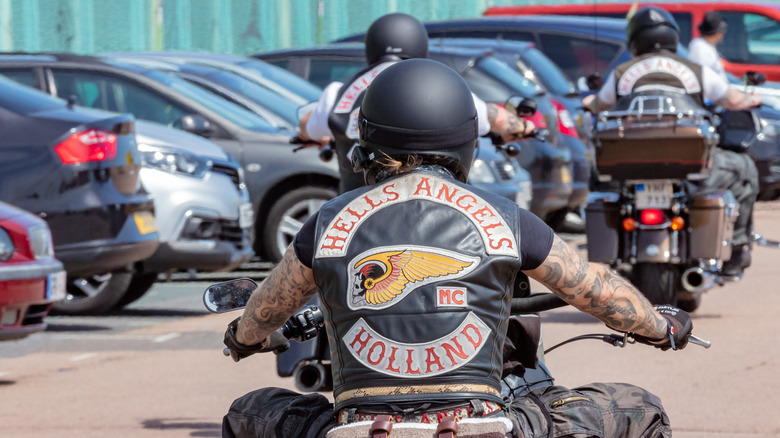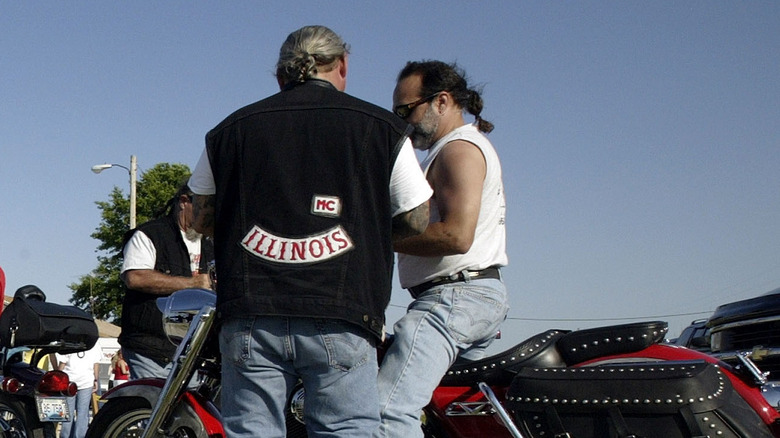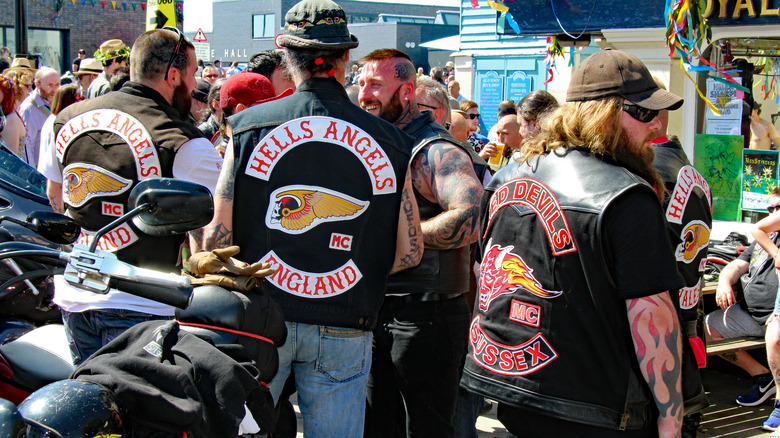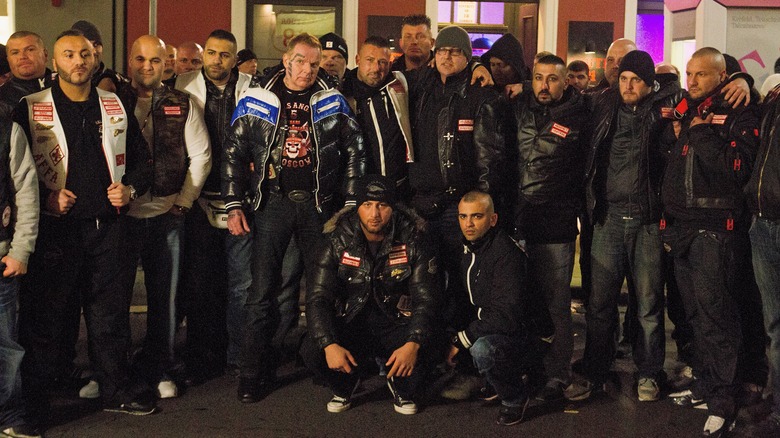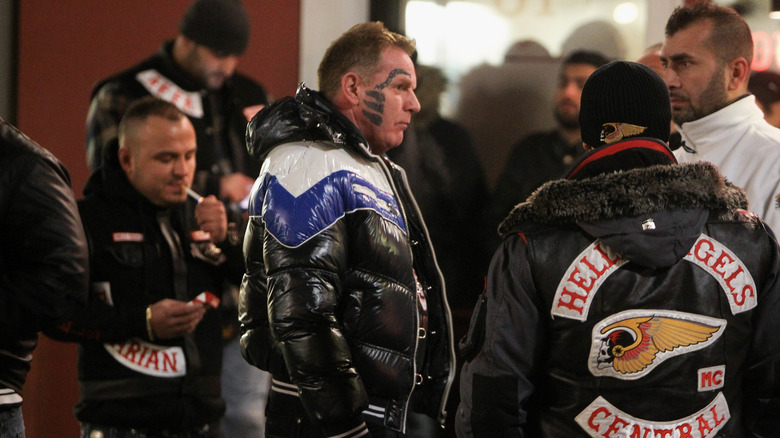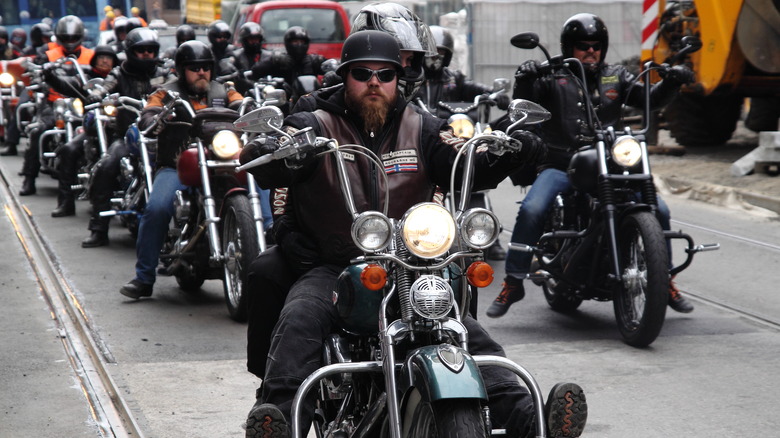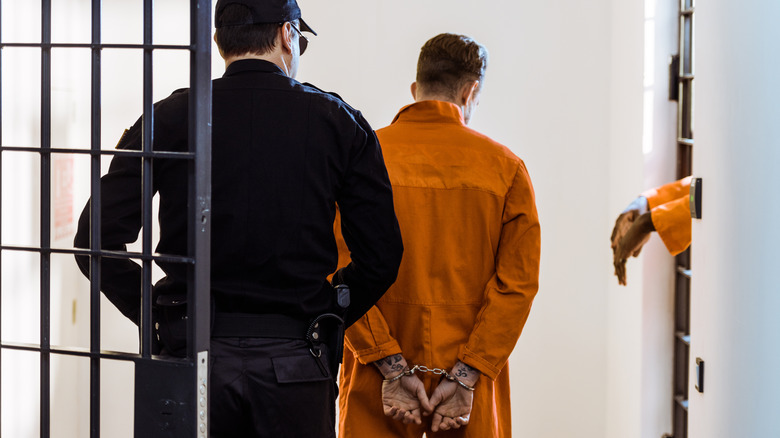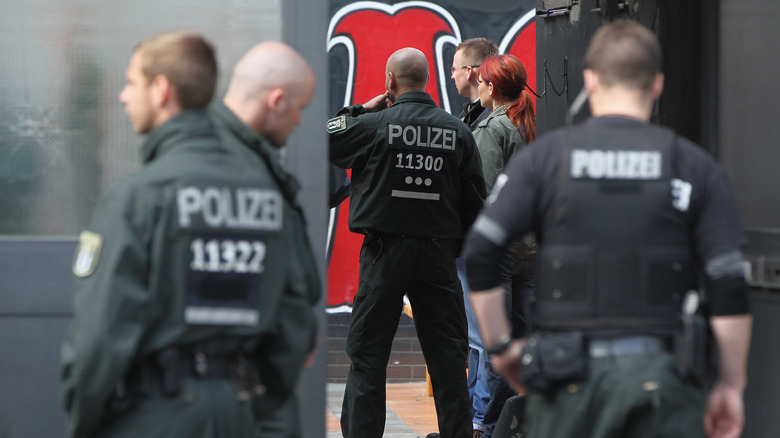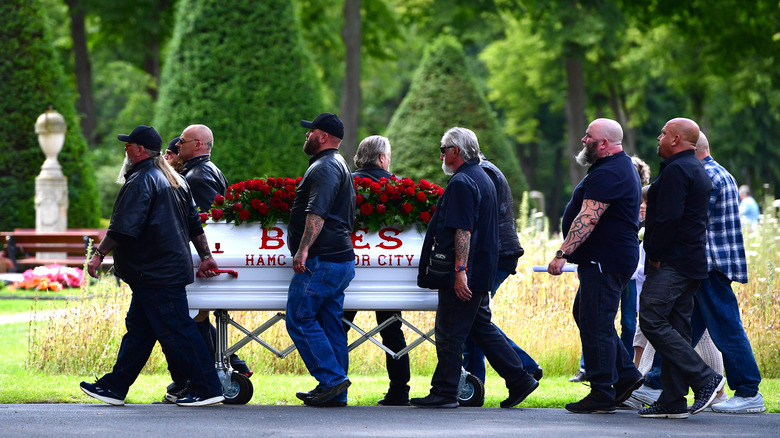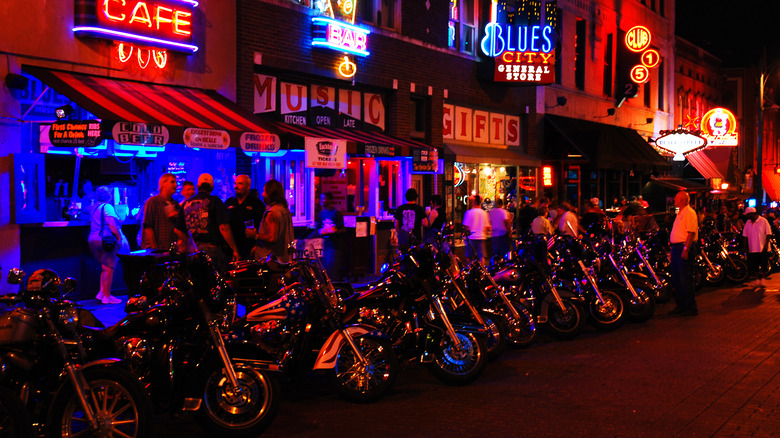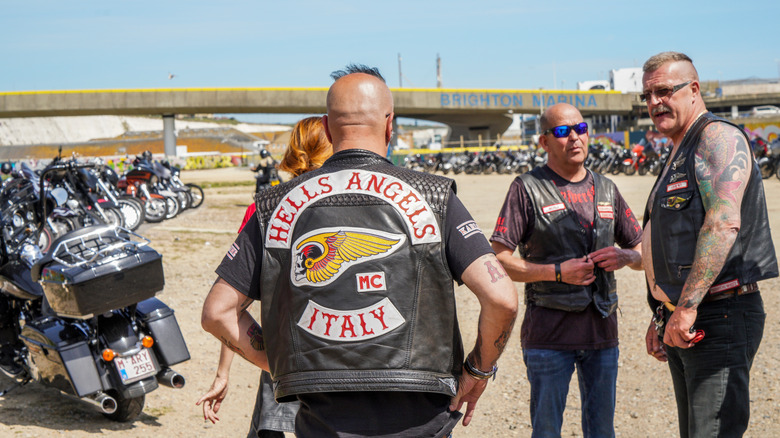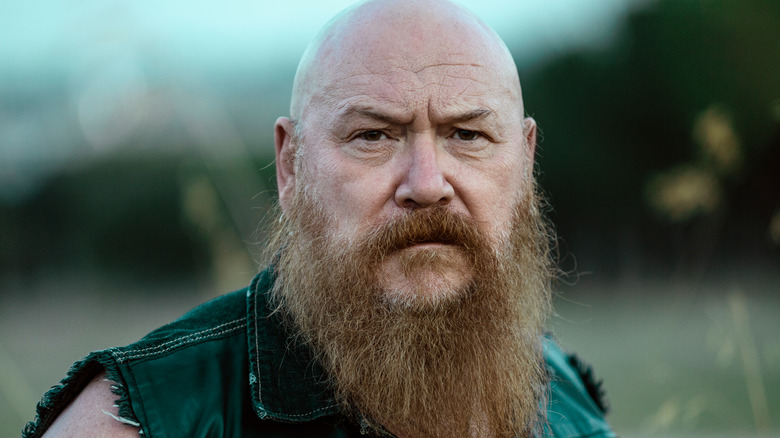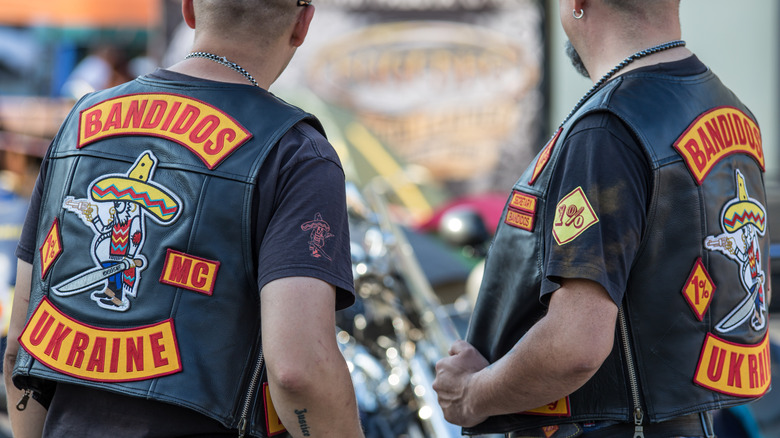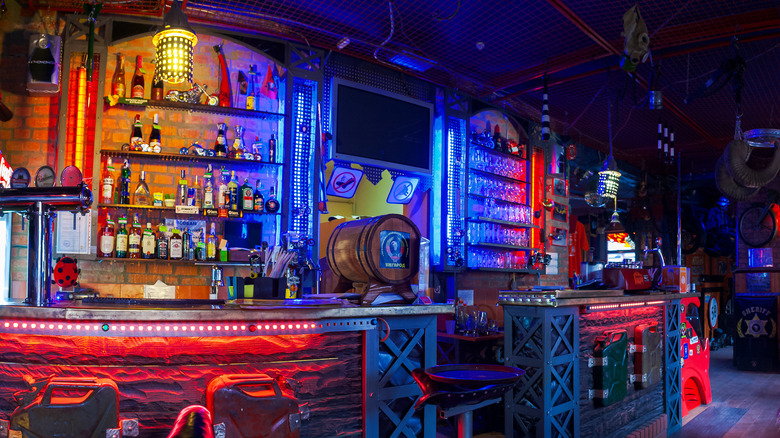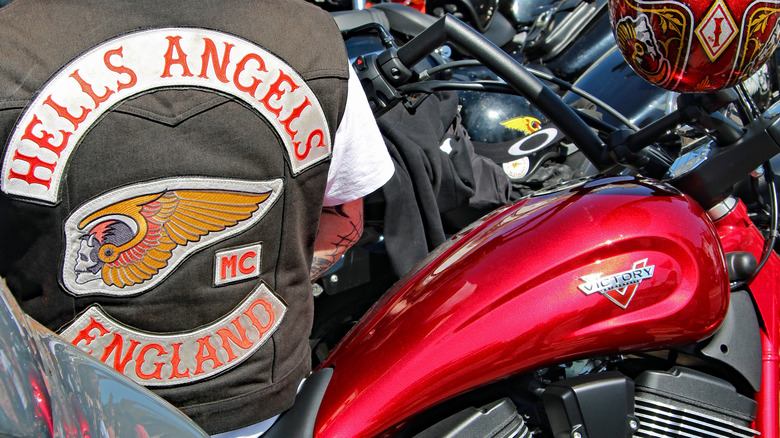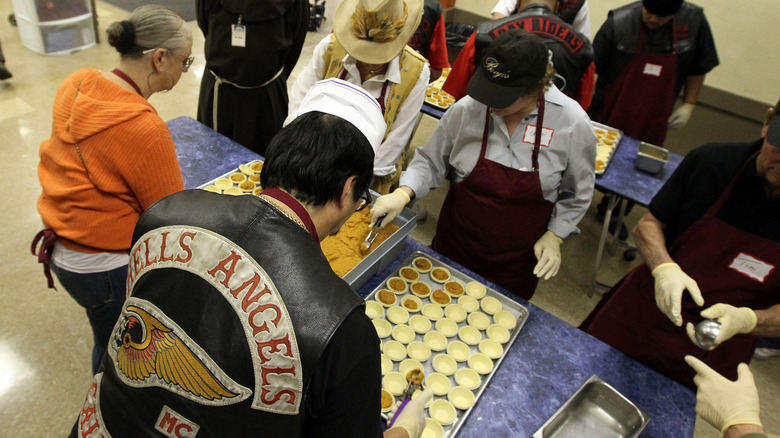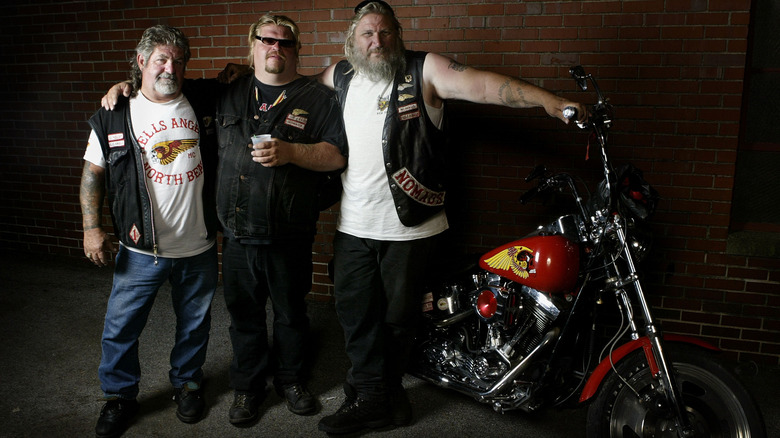Rules Hells Angels Have To Follow
The infamous Hells Angels biker gang has been given a lot of bad labels over the years — outlaws, criminals, drug dealers, and so on. Not to say that those are inaccurate descriptions for many of their members who have been convicted of several different crimes, from weapons possession to drug trafficking meth, assault and even murder. But while these terms do not define all of them, the vast majority can truly be viewed in another way too, as warriors.
In 1948, World War II veterans created the Hells Angels Motorcycle Club (HAMC) when they were growing restless in peacetime, and surplus bikes from the military were dirt cheap. "Hell's Angels" also originally came from the popular nickname for bomber squadrons, so the organization has a strong military foundation. And like them or not, warriors are known to live by a code. The HAMC is no different.
There are few who know the Hells Angels better than former president of the Oakland, California, chapter, Ralph "Sonny" Barger. And in his book, "Hells Angel: The Life and Times of Sonny Barger," he says the motorcycle club "tries to exist with as few rules as possible." But the rules they do have are vital to the survival of the club. This means that if a member breaks the most important parts of the code, there are severe consequences. Some are simply expelled and forced to abandon everything they know. Others are not so lucky and lose their lives.
Members have to be voted in
There are a lot of wannabe cool guys in the world who would desire to join the Hells Angels for both the notoriety and respect that comes with membership in such a group. Though ultimately, few make the cut, so the club can take as long as it needs to determine if someone has the necessary commitment and loyalty to become a member. Then once a candidate has proven they can be trusted, the entire chapter meets and holds a vote. If the majority agree without any objections, a new member of the HAMC is made, as per the Vancouver Sun (via Canada.com).
Though long before the vote, it takes several years to forge a prospective member into a fully-fledged Hells Angel even before the official process can begin. In his book, "Hell to Pay: Hells Angels vs. the Million-Dollar Rat," Neal Hall says a candidate must have already been personally acquainted with a full member for no less than five years until they will even be considered worthy.
As detailed by the Vancouver Sun, acquaintances who qualify can then try to become what is called an "official friend," if they have a sponsor and win unanimous approval in their first chapter vote. Yet as just one of many ways that the club has shown how extremely cautious it is, the next stages can still take years as candidates move up to what is known as "hangarounds" and then "prospects," before the final vote takes place for full membership.
Patches and vests are part of a strict dress code
Like the warriors of old, the Hells Angels rush into battle displaying their fine heraldry and insignia. Though there is certainly a modern twist to the bikers' iconic imagery, meaning that the founders of the club had the great sense to fully trademark the now classic symbols called patches and protect them with copyright law, as per the Hells Angels website. This way, the bikers do not always have to resort to violent intimidation to do so.
The gang strictly forbids anyone else from wearing their insignia, and most obey the rules, whether it is out of fear from legal repercussions, or simply just not wanting to get beat up. As Sonny Barger says in his book, "Hell's Angel: The Life and Times of Sonny Barger," members are willing to "fight to the death" for their club and the symbols that represent it as well. So, if someone is caught wearing a patch without being a member, he will certainly get his butt kicked.
The members of the HAMC proudly display the Hells Angel logo and Death Heads winged skull insignia on their vests and jackets almost anywhere they go. According to Sgt. Jacques Lemieux, a Canadian police expert in motorcycle gangs, the Hells Angels want everyone to know that they are part of the most powerful biker gang in the world (via the Vancouver Sun). Yet even if the bikers were not more than willing to show off their symbols with pride, the HAMC mandates its members to wear their patches and vests whenever they are together as a way to constantly show their commitment to the club, reports the Duluth News Tribune.
Members always back their brothers
Like how soldiers depend on their comrades in battle, the Hells Angels know that other members will always be there for them when in trouble. According to another former Hells Angels president, George Christie, the main rule is to always back other members (via History). The support is there even if it could lead to violent, bloody encounters.
Christie learned the importance of this rule before he was even a Hells Angel in 1976. As he tells History, when he was a prospect for the Los Angeles chapter, an outsider with a bad attitude pissed off the club president, known as "Old Man John." So, John hit him several times and threatened to cut the man's throat with a knife as he looked up at Christie to see his reaction. After seeing in his eyes that Christie was willing to back whatever action John took, the president was satisfied with the recruit. John then cut off the imposter's jacket and kicked him out of the bar.
The code of silence is mandatory
Club meetings are a vital part of the club to discuss all sorts of important business. But what is not talked about is any sort of illegal activity. The club's security is of utmost importance, so these subjects are completely avoided in official discussions, says George Christie (via History). Even though the Hells Angels do not consider themselves a criminal organization, they still acknowledge that some of their members may be involved in activities outside the law. Because of this, no members are allowed to discuss these outside activities at the club or in any way that would tarnish the reputation of the MC.
Christie claims that the reason law enforcement agencies categorize the club as criminal is because it is easier for them to target the entire organization rather than specific individuals within the club. If this is the case, it would be easy to see why since it is nearly impossible for the police to infiltrate the Hells Angels, according to the Review Journal. Strict rules have created highly effective barriers to law enforcement, such as the years-long membership process and the "structured hierarchy" of the club, along with the careful restrictions over what is discussed.
Members ride together in formation
As a motorcycle club, the Hells Angels spend a considerable amount of time on their bikes and often travel together as a group. With a chain of command similar to a paramilitary organization, notes the Vancouver Sun, the established hierarchy is respected at all times — which is clearly seen when they ride, if you ask Sgt. Mark Baker of Minnesota State Patrol (via Duluth News Tribune). As the fearless leader, the chapter president always rides in the front even if that places him at the most risk for possible collisions.
Tradition usually has the vice president traveling next, followed by the road captain and the sergeant of arms. However, after the chapter officers, Sonny Barger in his autobiography describes the situation as being much more chaotic: "From that point back, it's a ... free-for-all drag race, jockeying for position. ... After the first ten spots are taken, the rest fall back in from there." And obviously, prospects are always at the back of the pack.
To keep order while on the road, the bikers tend to stick with a formation once it has been established, Baker tells the Duluth News Tribune. And since the Hells Angels never leave a brother behind, they often pull over together, especially if a member has been stopped by a cop.
Members cannot work for a prison or be a cop
Before someone can even try to become a member, there are certain things that instantly disqualify a person. Child molesters and rapists can never join the Hells Angels, writes Neal Hall in "Hell to Pay." The club also does not want their members to have any connection to law enforcement whatsoever as well. This means that if someone took any steps to become a police officer or prison guard, there is no chance he can ever join the club, says Hall. Even if it is found out that someone only applied for a job, that still makes them unworthy to wear the patch.
It seems likely that this rule is in place to make it easier for the bikers to continue certain criminal activities without getting caught, as Hall also notes "criminal activity" isn't allowed in the clubhouse and "members should not [bring] attention to themselves." However, it is not that simple. Loyalty means everything to the Hells Angels, so there is no way they would ever accept someone who has taken an oath for any other group or cause, even if it is to uphold the law (via Demons Row TV).
Members can't be snitches or 'rats'
There are few types of people that the Hells Angels despise more than the ones who tell the private business of the club, or its members, to law enforcement. The HAMC also forbids snitches and rats from ever becoming members, writes Neal Hall in "Hell to Pay," which is another obvious way to protect the club. However, it could be possible that some of the bikers hate these people even more than the convicted felons that Hall also notes are prohibited, so there is a higher level of loathing behind the exclusion for snitches.
Sonny Barger in his book "Hell's Angel" does not mince words when describing these types: "Most rats are loud-talking bullies who like to push people around and talk tough when the club surrounds them. They thump their chests and yell about how much they love the club and how they're going to be with us for the rest of their lives." He goes on to note that when and if they do get in trouble, "they rat on their brothers to save their own skins." Barger says that because brotherhood and loyalty is so important to the club, "a rat is the true enemy."
Always a Hells Angel
The initiation process of the HAMC is so long and thorough because it is meant to attract the most loyal members possible who are in it for the long haul. So, the Hells Angels do not officially recognize any retirement from the club and expect members to stay for life (via the Hells Angels website). A chapter becomes a member's new family, and his brothers gather to honor his memory when he dies. Sonny Barger points out in his book, "Hell's Angel," how the cops used to mock the bikers for their mile-long processions for the funerals of deceased members in the early history of club, but now that is common practice almost everywhere.
However, the club acknowledges that some members have been forced to disassociate themselves due to problems with the law. Other members have been expelled for breaking the club's code. For some of these men, getting kicked out is not enough of a punishment and have had their Hells Angels-themed tattoos burned off, reports the Duluth News Tribune.
There are also members who have resigned and forced to return anything with the Hells Angels name or "Death Head" insignia, according to Britannica. One of the most famous examples of this is the retirement of George Christie. According to the former member, he explained his reasons for quitting and thought he left on good terms with the club, as per Vice. However, Christie was shocked weeks later to discover that he was not in "good standing" and was instead "out bad." The result was the end of all contact with men that used to consider him a brother.
Never talk to the media
The Hells Angels do not want their private business to be known publicly, so as a precaution, members are not allowed to talk to the media, reports the Duluth News Tribune. This is just another one of the many steps the club takes to retain their secrecy and security. It is important for them to keep personal information about members safe from reporters, but Sonny Barger in his autobiography admits there are other rules and parts of the Hells Angels code that will never be released to the public.
In 2009, evidence of the biker club's stance towards the media was on full display at their annual summer rally in Carlton, Minnesota. With around 500 of the notorious bikers in attendance, reporters went to the event but noticed that the Hells Angels would consistently stop talking or turn their backs on the media whenever they were present, according to the Duluth News Tribune.
Only Harleys are permitted ... for the most part
It is quite obvious that all members of the motorcycle club must own a bike. When Neal Hall lists off the main rules for prospective members hoping to join in his book, "Hell to Pay," he starts off by saying you must own a driver's license and "a motorcycle (a big Harley-Davidson, not a 'sissy' bike)." Yet regardless of that comment, it is only tradition that it has to be a Harley. Sonny Barger (via BBC) says "everybody in the club rides Harleys" but admits in his autobiography that there is no rule that the motorcycle must be exclusively from that manufacturer.
However, the former chapter president is highly critical of Harleys and says they are a "piece of junk, in terms of machinery," while claiming there are many other members who would agree with him. But even if Japanese bikes perform better, he says that the Hells Angels will never give up their Harleys — not only because of tradition but also for patriotism as well (via the BBC). Barger also notes the love for that loud "grumble" sound Harley's are famously known for, and the more low-end torque.
Members must attend club meetings
Clubhouses are considered home to the Hells Angels, and an essential part of being a member is to attend the weekly meetings that take place there called "church" (via History). All sorts of club business is discussed regarding members and important issues like how to deal with the police or the media. As George Christie tells History, these meetings can be very personal if someone needs to be disciplined, such as if a member has an issue with drugs or alcohol.
To the Hells Angels, showing up to "church" and club events not only shows commitment, it is also a sign of respect for the club. Members and prospects are expected to attend "church" every week at the clubhouse, as per "Hell's Angels" by Yves Lavigne. If a member misses a meeting without a good reason, he has to pay a fine of $50-100, notes Sonny Barger in his book, "Hell's Angel."
Only men can become members
Women aren't completely excluded from the club. They can hang out at the clubhouse, especially if they are the wives and girlfriends of members, who are known as "old ladies," notes Sonny Barger in his book, "Hell's Angel." As an essential part of the lifestyle, these women spend much time with their partners, often on the road as well. And in the early days, "old ladies" even wore the treasured patches to increase the exposure of the insignia, Barger says.
But even respected "old ladies" can only attend meetings on special occasions because women are not allowed to ever become official members. According to Barger (via BBC), the Hells Angels are "male chauvinist pigs as far as women are concerned but we have a right to be because we want to be."
The Hells Angels also rely upon women in key positions to gather intelligence on law enforcement agencies and rival gangs, says Sgt. Jacques Lemieux, as per the Vancouver Sun. The information obtained is vital to the organization, and the club has had these female spies as air traffic controllers and even in the military.
It is forbidden for members to join another club or gang
The Hells Angels want their members to be loyal to the club above all else. So, just like how they do not want their members taking oaths to serve the law, they also do not want their members loyal to another group. In the past, this rule was so strict that the HAMC did not allow their members to even join the American Motorcyclist Association, says Sonny Barger in his autobiography.
The rule is especially true for rival groups that do not have a good relationship with the Angels, which would be many biker gangs. Throughout its existence, the HAMC has had conflicts with several other clubs, including the Mongols. One of the most brutal incidents in recent memory occurred in 2002 when the two rival groups violently clashed at a Nevada casino and all hell broke loose (via Time). The situation was described by George Christie (via Vice) as like armies fighting against each other with the Hells Angels hostile towards all the major clubs along the West Coast.
Hard drug use and drug burns are forbidden
The Hells Angels have been very open about their use of drugs like weed, according to History, for quite some time. However, members are supposed to follow guidelines in order to limit some of the chaos that comes with drug use, such as some of the harder ones being unacceptable. The HAMC forbids the use of heroin and needles, mostly because they feel that drug addicts cannot be trusted to always put the club first.
Other rules are more specific for certain circumstances. Sonny Barger says in "Hell's Angel" that smoking weed, or even cigarettes, is prohibited during meetings. And especially if some members are under parole, probation, or might get drug-tested, Barger says no one should spike the booze because nobody wants to get messed up unexpectedly.
For a time, the club also banned rip-offs in drug deals, known as drug burns, because stealing damages the reputation of the club. However, Barger claims this is no longer a rule because the cops have used it against them too many times to make criminal charges against the organization.
Members and applicants need to pay dues
The Hells Angels aren't just a motorcycle club, and according to Fortune, the bike clubs of the U.S. (and their international branches) have been operating as businesses for a long time.
In 2017, Maclean's spoke with Dave "Shaky" Atwell, a former Hells Angel turned police informant. He gave a fascinating look at what goes on behind the closed doors that are usually off-limits to outsiders, including what prospects and members were expected to contribute to the club. Atwell said that illegal activities aside, club members paid regular dues. Even more surprising, they were also expected to contribute by selling the club's merch, which seems like a weird thing. Atwell explained: "It was very corporate. ... It was about being a cog in a money-making machine."
He wasn't talking about $20 a week dues, either. When he turned informant, the law enforcement officers he was working with gave him a stipend to cover the expenses he incurred as a Hells Angel. It amounted to a shocking $1,850 each and every week, which covered all his dues and all other expenses that came with being a full member of the club. That, Atwell says, was an average. That same year, the CBC reported that Canadian branches were seeing a decline in membership numbers. Reasons behind the decline were likely to be complicated, but RCMP Sgt. Angie Hawryluk explained one thing she'd heard rumblings about: "We've heard that they dropped out because they couldn't afford it."
Never allow patches to be destroyed
In 2009, the Duluth News Tribune spoke with an investigative journalist named Julian Sher. He had been looking into the Hells Angels for almost a decade — and had written a book called "Angels of Death: Inside the Biker Gangs' Crime Empire." According to Sher, there was a lot that just wasn't publicly known about the group's code of honor: "[The code] is a part of their mystique. It's part of their secrecy and, to some degree, a part of their security."
One of the things that is publicly known is the importance put on their patches. It's more than just about wearing them everywhere, and Sher says the vests are sacred. In other words? Don't touch them. Sher says that there are even protocols that say what happens to vests when a member gets arrested, and says that instead of having anyone else touch the vest, members will give it to one of their brothers to take care of.
According to SMDC Health System's manager John Jordan, it goes even farther than that. He said that they needed to get a crash course in the special considerations of caring for a Hells Angel in case of an emergency or accident, and was informed that the typical procedures of cutting through a patient's clothing to get to an injury — rather than move them and risk doing more damage — didn't apply. They were under no circumstances to cut through a patch: "They're sensitive to any desecration."
Participate in charity events and toy drives
The Hells Angels sign on with a promise to promote motorcycling and hold public events to reach out to the community. Sound unlikely? According to the Belfast Telegraph, members are expected to go to public events — and usually, there are charities attached to those. In 2002, a British group of Hells Angels rode for the Queen as a part of a fundraiser for an anti-bullying organization called Kidscape.
Stateside, Hells Angels members are expected to participate in toy drives around the holidays, like the one that must have scared the bejeezus out of Walmart shoppers in Fresno, California a few years back. In 2015, CNBC News reported that the Hells Angels started camping outside the store five days before the holiday rush kicked off: When it did, they bought all the bikes the store had, as a donation to a local homeless shelter.
In 2020, the Stockton Hells Angels put out a call that they were collecting donations to fulfill the wish lists of local families and children (via The Stockton Record). That's wholesome stuff, but it doesn't always go as planned: In 2014, the Los Angeles Times reported that four Hells Angels had been arrested after leaving their chapter's Christmas toy drive. Still, in 2018, the Hells Angels' Matt Yarber explained to WIFR: "A lot of these kids don't have anything; they don't have any presents or anything, and somebody's got to do something."
The club comes first — unconditionally
Dave "Shaky" Atwell was the highest-ranking Hells Angel to ever turn police informant, and spoke with Maclean's about what went on behind closed doors. According to him, once he became a full-time biker, he had "a duty to serve the club. ... That was my life."
When the Belfast Telegraph did a deep dive into what really went on inside a biker gang, they wrote about the history of the Hells Angels, then spoke with a biker named Colin. He was a member of another group who happened to know a handful of the Hells Angels, and when he was asked why he hadn't become one, he replied that he hadn't had the ability or willingness to commit to the 100% the MC demanded of members. He explained: "The hardest part is knowing how to deal with having a family. You always have to put the club first. It's a real commitment. You can't hold down a full-time job, because if the club needs you and calls, you have to be there."
Not showing up when called, Colin explained, was essentially seen as giving the big ol' middle finger to the club — and that obviously wouldn't stand. While he said that having kids might give a member a little bit of leeway, there was still an expectation that the club would come first over family and jobs. Any other commitments? Simply put, there were no other commitments that came before the club.
Women have their own set of rules
One-time president of the Hells Angels' Oakland, California branch Ralph "Sonny" Barger once described the MC to the BBC as just about as chauvinistic an organization as anyone could imagine. Why were they like that? "Because we want to be," was the reply.
Women aren't allowed to become members, but they're around: Referred to as ol' ladies, they have their own set of rules they need to abide by ... if they want to continue being seen alongside their Hells Angel of choice, that is. An anonymous 4-year ol' lady veteran wrote a piece for South Texas Biker, outlining what she learned the hard way when she became a part of the biker scene. She says that the bottom line is women are expected to respect their men, and they do it by first not touching his vest or his bike — and definitely not leaning against the patch when you're riding.
Doing anything that could be interpreted as bossy, asking any questions, interrupting men who are talking, acting like you're a part of the group, not acting like a lady, dressing provocatively, gossiping about the club to outsiders, and questioning literally anything the man does are all absolutely forbidden. In short? Keep quiet and look pretty.
